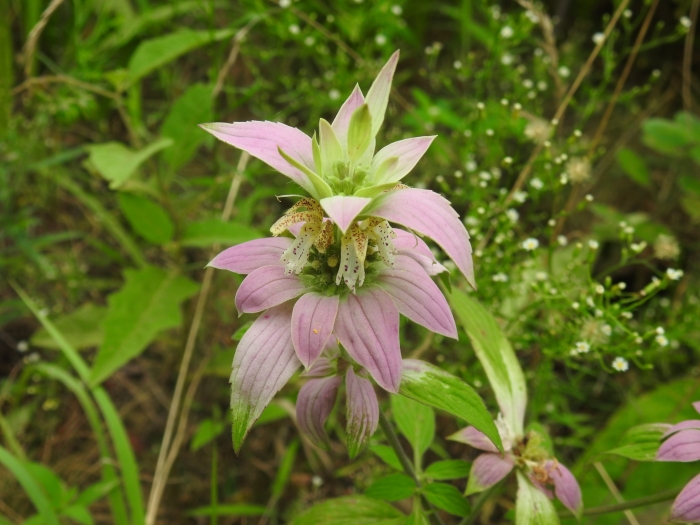Spotted Beebalm
(Monarda punctata)
Spotted Beebalm (Monarda punctata)
/
/

Yann Kemper
Public Domain
Image By:
Yann Kemper
Recorded By:
Copyright:
Public Domain
Copyright Notice:
Photo by: Yann Kemper | License Type: Public Domain | License URL: http://creativecommons.org/publicdomain/zero/1.0/ | Rights Holder: Yann Kemper | Publisher: iNaturalist | Date Created: 2021-08-13T13:40:04-07:00 |

















































Estimated Native Range
Summary
Monarda punctata, commonly known as Spotted Beebalm, is a deciduous perennial herb native to sandy soils in open pine woodlands, coastal plains, and prairies across the Central and Southern USA, as well as Northeastern Mexico. It typically grows to a height and width of 2 feet (0.6 meters) and 0.8-1 feet (0.2-0.3 meters), respectively. The plant features a unique appearance with whorls of purple-spotted tubular yellow flowers, each surrounded by showy, leaf-like bracts that are often white or pink-tipped, blooming in summer. These bracts are more conspicuous than the actual flowers and add to the plant’s ornamental value.
Spotted Beebalm is valued for its aromatic, thyme-scented foliage and its ability to attract pollinators such as bees and butterflies, making it a popular choice for native plant gardens, pollinator gardens, and as a naturalized border plant. It thrives in full sun to part shade and prefers well-drained soils, tolerating both low and medium water conditions. While it is generally low-maintenance, it can be susceptible to powdery mildew in humid conditions. Historically, Monarda punctata has been used for medicinal purposes due to its content of thymol, an antiseptic and fungicide, to treat various ailments.CC BY-SA 4.0
Spotted Beebalm is valued for its aromatic, thyme-scented foliage and its ability to attract pollinators such as bees and butterflies, making it a popular choice for native plant gardens, pollinator gardens, and as a naturalized border plant. It thrives in full sun to part shade and prefers well-drained soils, tolerating both low and medium water conditions. While it is generally low-maintenance, it can be susceptible to powdery mildew in humid conditions. Historically, Monarda punctata has been used for medicinal purposes due to its content of thymol, an antiseptic and fungicide, to treat various ailments.CC BY-SA 4.0
Plant Description
- Plant Type: Subshrub, Herb
- Height: 1.5-2 feet
- Width: 0.8-1 feet
- Growth Rate: Moderate
- Flower Color: Pink, Yellow
- Flowering Season: Summer
- Leaf Retention: Deciduous
Growth Requirements
- Sun: Full Sun, Part Shade
- Water: Medium
- Drainage: Fast, Medium, Slow
Common Uses
Bee Garden, Bird Garden, Border Plant, Butterfly Garden, Deer Resistant, Drought Tolerant, Erosion Control, Fragrant, Groundcover, Hummingbird Garden, Low Maintenance, Potted Plant, Rabbit Resistant, Showy Flowers, Street Planting
Natural Habitat
native to sandy soils in open pine woodlands, coastal plains, and prairies across the Central and Southern USA, as well as Northeastern Mexico
Other Names
Common Names: Horsemint, Dotted Monarda, Monarda, Punktierte Indianernessel, Prickig Temynta
Scientific Names: , Monarda punctata, Monarda punctata subsp. punctata,
GBIF Accepted Name: Monarda punctata L.